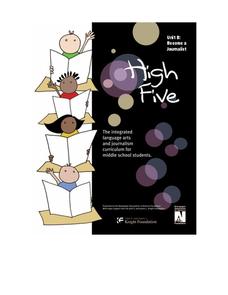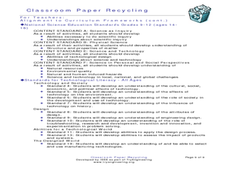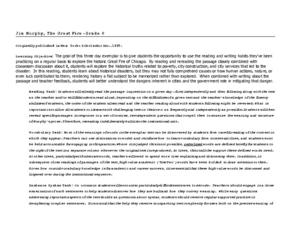Have Fun Teaching
Identifying Author's Purpose
The multi-lesson, 47-page packet contains everything you need to ensure kids can recognize the clues provided to identify the type of text, the intended audience, and the author's purpose in writing the passage.
Briscoe Center for American History
Mary Maverick and Texas History - Part 2
To conclude their investigation of the life of Mary Maverick and to demonstrate their ability to analyze primary source documents, groups use the SOAPS questioning method to examine Maverick's account of events in early Texas history.
Briscoe Center for American History
Mary Maverick and Texas History - Part 1
What's the difference between a diary and a memoir? Young historians explore the ramifications of this question as they learn how to use primary source materials to gain an understanding of life on the Texas frontier.
Briscoe Center for American History
Applying the SOAPS Method of Analyzing Historical Documents
Young historians use the SOAPS (Speaker, Occasion, Audience, Purpose, Subject) method of questioning to determine the historical value of primary source documents. The third in a series of five lessons that model for learners how...
Online Publications
Become a Journalist
Explore the newspaper as a unique entity with a detailed and extended unit. The unit requires learners to consider the newspaper's role in democracy, think about ethics, practice writing and interviewing, and examine advertising and news...
Institute of Electrical and Electronics Engineers
Get it Write
In an effort to practice engineering design, STEM classes break out into teams and endeavor to make a working ink pen. To prepare, they read about writing implements through history, patents, and viscosity of liquids. Armed with this...
Institute of Electrical and Electronics Engineers
The Power of Graphene
To prepare for the activity, STEM classes read about nanotechnology and the amazing properties of graphene. They collect a graphene sample from pencils, and then connect them into simple circuits to determine whether it makes a better...
Institute of Electrical and Electronics Engineers
Try Your Hand at Nano
Fascinating reading about nanotechnology, nanoscale properties, and liquid crystals precedes a fun activity for young engineers. They measure their hands in nanometers, research, and then investigate how heat effects a sheet containing...
Institute of Electrical and Electronics Engineers
Sugar Crystal Challenge
Blow your learners' minds with a sweet instructional activity on nanotechnology that uses sugar to demonstrate the difference nanoscale surface area makes in dissolving and crystal formation. Plenty of supportive background information...
Institute of Electrical and Electronics Engineers
Tinkering with Tops
Get kids' heads spinning by challenging them to design a top that will rotate for a minimum of 10 seconds without leaving a 30-cm circle. Groups of learners collaborate through a planning stage, testing stage, and evaluation stage. Some...
Curated OER
"I Can” Common Core! 6th Grade Reading
It is much easier for kids to know they have reached a goal when that goal is clearly defined. By providing sixth graders with a checklist of Common Core reading standards written in "I can" format, each child can keep track of his own...
Institute of Electrical and Electronics Engineers
Classroom Paper Recycling
After reading about the history and recycling of paper, creative crafters collaborate to think of a new process for making recycled paper. A complete teacher's guide and student worksheets are included. There is no written procedure for...
Institute of Electrical and Electronics Engineers
Nano Waterproofing
This lesson will make an impact, especially on scientist-athletes who may have an interest in waterproof clothing! Acting as materials engineers, they work collaboratively on waterproofing pieces of cotton fabric. This challenge is...
Institute of Electrical and Electronics Engineers
Telescoping Periscope
Ahoy, matey! Here is an engineering expedition that mini mariners are sure to be swept away by! After reading a brief description and history of periscopes, they work in crews to construct one. Use this activity to enhance a activity on...
Institute of Electrical and Electronics Engineers
Filtration Investigation
Scholars build a simple filtration system to remove impurities from muddy water and rate the filtered water to a grade of clarity scale. The focus is on teamwork and problem solving. This instructional activity would be effective in your...
Institute of Electrical and Electronics Engineers
Exploring at the Nanoscale
Nano-nano! Nanotechnology can seem like it's from another planet! After learning about this tiny technology, collaborative groups experiment with how smaller particles affect chemical reactions. They do this by immersing a whole and a...
Institute of Electrical and Electronics Engineers
Working with Watermills
In collaborative groups, emerging engineers or environmental scientists plan and construct a water wheel or watermill that rotates for a total of three minutes. Everything you need to carry out this instructional activity is included:...
Smithsonian Institution
A Ticket to Philly—In 1769: Thinking about Cities, Then and Now
While cities had only a small fraction of the population in colonial America, they played a significant role in pre-revolutionary years, and this was certainly true for the largest city in the North American colonies: Philadelphia. Your...
Curated OER
Jim Murphy, The Great Fire - Grade 6
The Great Fire by Jim Murphy provides the text for a study of the Chicago fire of 1871. The plan is designed as a close reading activity so that all learners have the same background information require for writing. Richly detailed, the...
Curated OER
Youth Obesity: Schools Fight Back
Kids fight obesity by comparing the USDA food intake suggestions to what they personally consume throughout the day. They watch a video, read texts, and explore related vocabulary which they use as they compose an oral presentation.
Curated OER
Experience and Perspective
Sixth graders make connections between past experiences and perspective. They read Keeping the Night Watch by Hope Anita Smith. Then, they analyze a character's history and state the past experiences that form their perspective. In the...
Curated OER
What's the Author's Purpose?
What is the author's purpose for sharing an autobiography? Start this lesson with the short story provided about getting pulled over by a police officer. Then, discuss the acronym PIES and how it stands for the four main reasons an...
K20 LEARN
Unlocking Answers: Keys to Great Research
Successful searches for information require more than just a device with Google access. Young researchers learn how to use keywords and hashtags, as well as how to evaluate sources and how to paraphrase without plagiarizing in a fun...
Curated OER
How Will We Create a Future without Waste?
Many young people act globally by reducing, reusing, and recycling, Now they take it to the next level by upcycling. Middle schoolers design a proposal to eliminate waste by exploring the new material cycle and applying their knowledge...




















